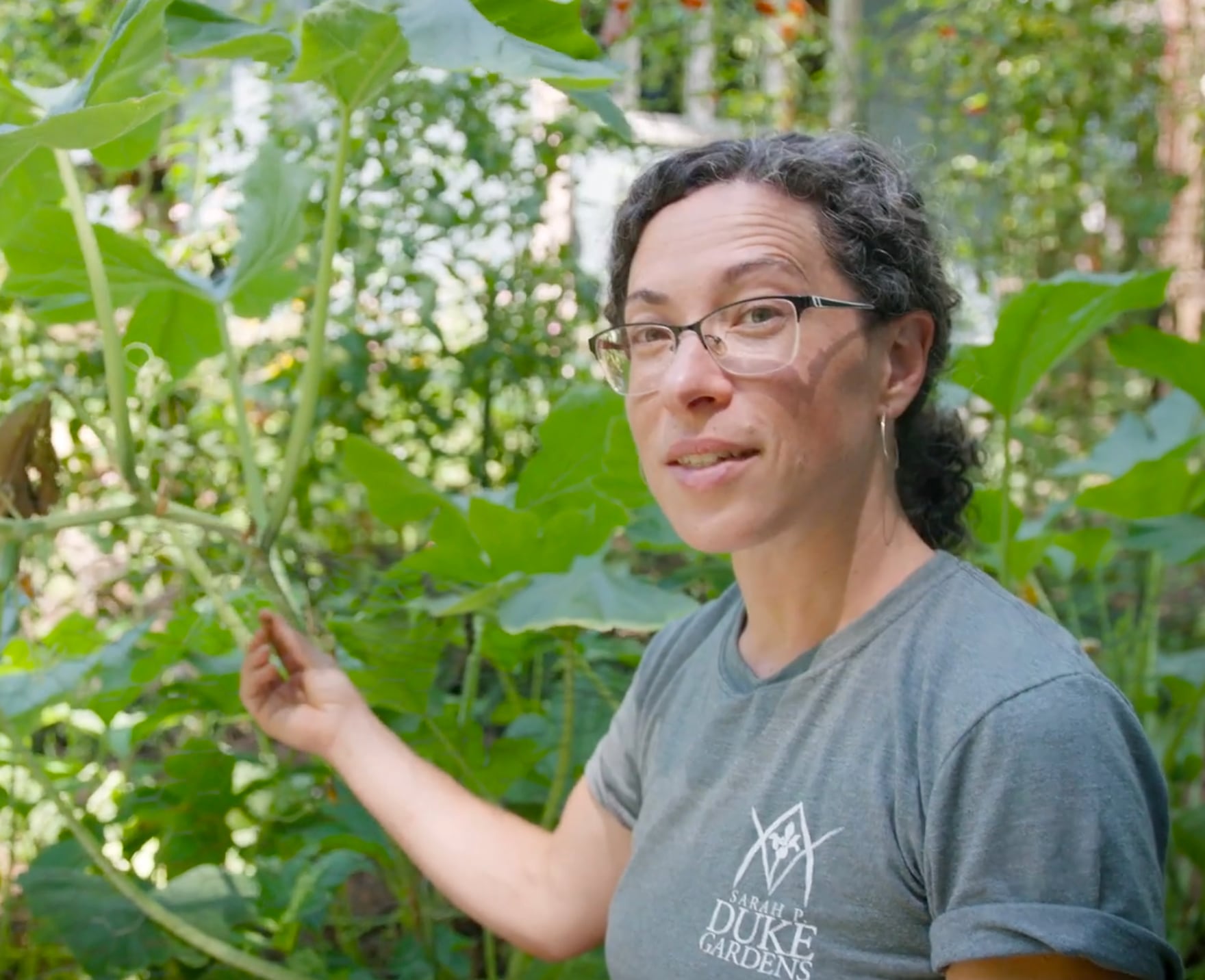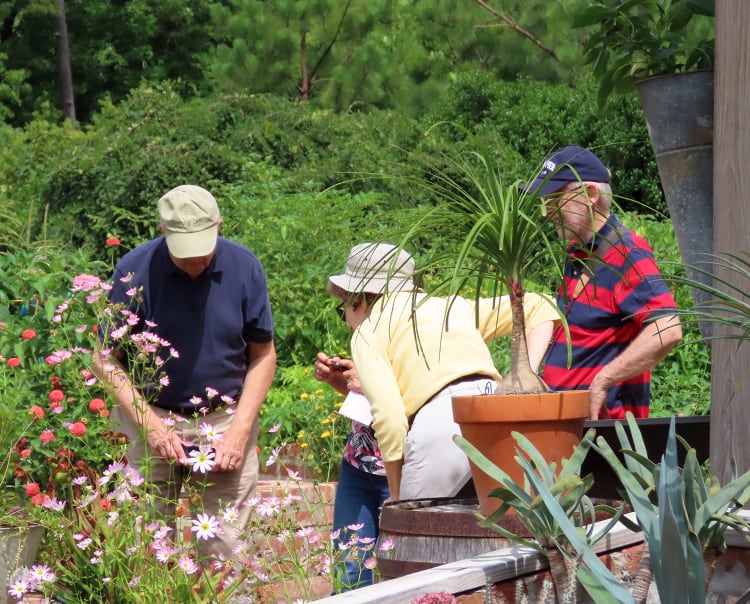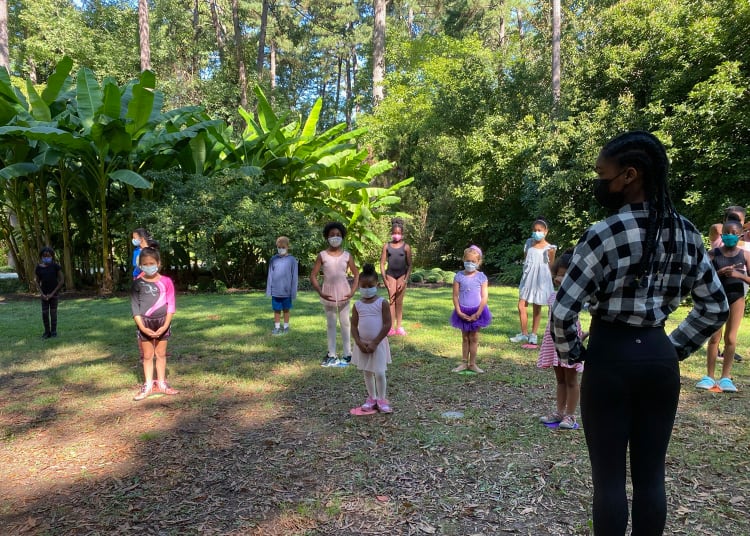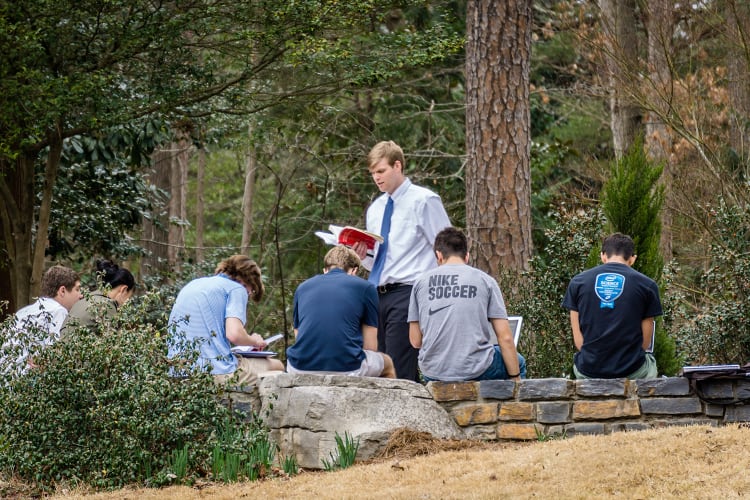Collaborations Embrace Two-Way Teaching and Learning
by Jan Little
Duke Gardens is a 55-acre place of wonder.
Perhaps for you it’s the fragrance of paperbush or tea olive. For other people it’s rolling down the slopes of the South Lawn. The wonder is unique to each visitor who steps through the gate and into the Gardens.
Duke Gardens is also an idea of unlimited wonder.
Maybe it’s seeing the flower of a plant used in your healing traditions. Perhaps it’s watching a vegetable grow in the Charlotte Brody Discovery Garden, a vegetable that your family has grown for generations. Our senses, knowledge, memories and traditions spark strong connections to events and people from long ago and carry the idea of the Gardens beyond its borders.
Being both a place and an idea gives Duke Gardens an immense opportunity to collaborate with many individuals and learn from more than one narrative. Across our communities there is a growing recognition that all visitors have unique knowledge and traditions to share. Being both teachers and learners offers us the chance to recalibrate our relationship with the wider world and celebrate the richness of many traditions.


The Piedmont Naturalist programs explore natural systems as well as human systems. Making science real and relevant to people is dependent upon our illustrating the link between human and natural systems. This program also offers the opportunity to collaborate with other community organizations, including TREESDurham , the Ellerbe Creek Watershed Association and the Triangle Land Conservancy (TLC). Ellerbe and TLC are now co-sponsors of this series. These partnering groups offer expanded expertise and insight. Partners also assist in building a series that is far-reaching and significant in everyday lives while helping us reach a larger network of participants.
The series’ topics have included the ecological function of insects, soil processes, the benefits of urban green space for health and business success, environmental justice, the natural history of birds, plant ethnobotany, oaks and their role in nature, invasive species, and how plants have adapted to changing environments over time.
In the environmental justice class, participants examined the scale of various ecosystems. Your skin can be considered an ecosystem, along with your home, your neighborhood, your community and so on. Each ecological scale will function uniquely, and you can impact each scale using different methods. This class looked at the processes of their local government, identifying advocates and determining how they could be part of that conversation.
Participants in these classes have also studied different Durham neighborhoods to learn about long-ago housing policies that affect our environmental health today. The locations of industry, housing, green space and trees along our streets all reflect our values and have long-term outcomes. Durham is currently facing a decline in the urban tree canopy due to age. That is a challenge that also offers us an opportunity to consider an equitable distribution of street trees so that all in our community may enjoy the benefits that trees provide.
The Gardens works closely with Durham Public Schools (DPS), in partnership with teachers, curriculum experts and others in the schools, extending classroom goals into outdoor environments. This year we delivered 32 virtual programs to grade school students, and we collaborated with the DPS Science Alliance and with Building Outdoor Learning Durham (BOLD) to increase outdoor education opportunities.
Beyond gardening and horticulture, the Gardens celebrates the human spirit and history with nature. This fall, middle school students are taking a dance class in the Gardens through Empower Dance Studio and a UNC-Chapel Hill student project. The participants often stay after class to stroll through the Gardens with their families.


Duke Gardens expanded its partnerships for the Durham-wide Bioblitz in spring 2021, working with 12 other organizations dedicated to environmental and community health. Through that network, we helped to organize the fall 2021 Ellerbe Creek Watershed Bioblitz. Several thousand community members have participated in these events by observing and reporting any form of life in Durham, submitting through iNaturalist for use in research about what species Durham supports.
The Equity Through Stories projects are innovative work-study programs for Duke students to conduct research and develop information for Gardens visitors. This work also helps us connect and build greater understanding with people that have historically been marginalized.
This approach to programming in the Gardens is exciting. It builds on our tradition of being open and available to all and strengthens our ties within the community. Exploring and learning together by stepping out of traditional teacher/student roles will foster sharing of information and traditions. We are interested in extending this idea of partnership with visitors and other community groups, inviting all into the conversation.
Photos, from top: Education coordinator Kavanah Anderson teaches about plant parts in a video for families; visitors learn more about the plants in the Discovery Garden; students learn dance with Empower Dance Studio and UNC-Chapel Hill students; Duke students study together in the Fisher Amphitheater.
